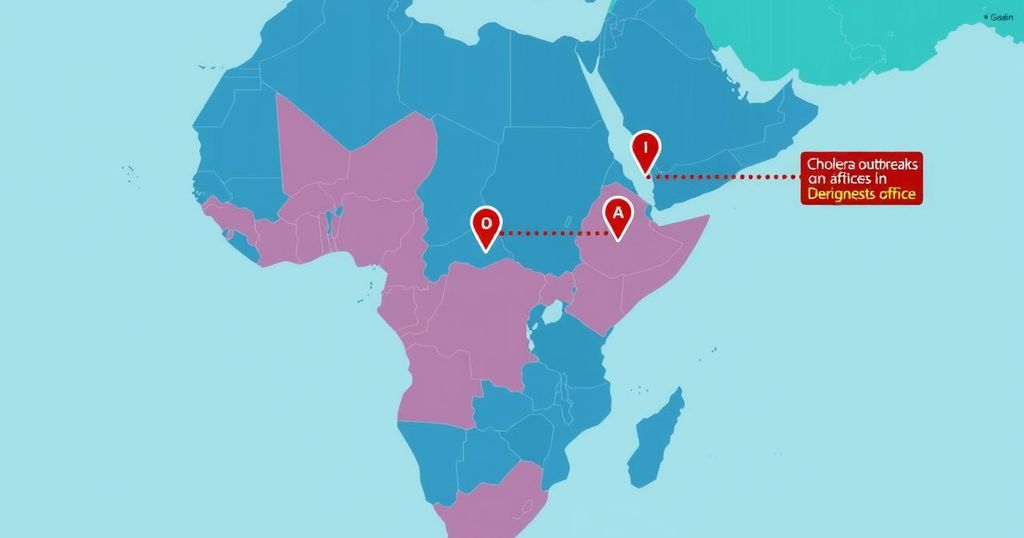World news
AFRICA, AFRICA CDC, AFRICA CENTRES FOR DISEASE CONTROL AND PREVENTION, ANGOLA, BOUM, CDC, DEMOCRATIC REPUBLIC OF THE CONGO, DISEASE, DISEASE OUTBREAK, FLOODING, HUMANITARIAN, INTERNALLY DISPLACED PERSONS (IDPS, MPOX, NATURAL DISASTERS, NORTH AMERICA, SUDAN, UNITED STATES, US, WHO, YA, YAP BOUM II
Stella Nguyen
0 Comments
Cholera Death Toll in Africa Exceeds 2,400 Amid Major Outbreaks
The Africa CDC reports over 2,400 cholera deaths in Africa, with South Sudan, DRC, Angola, and Sudan suffering the most. Lack of clean water and ongoing conflicts exacerbate the crisis. A coordinated response drawing from past experiences with mpox is essential to manage the outbreak effectively and promote long-term solutions.
The Africa Centres for Disease Control and Prevention (Africa CDC) has reported a staggering rise in cholera cases across Africa, with the death toll surpassing 2,400. As of mid-May 2025, approximately 115,513 cholera cases have been confirmed, bringing a grim reality to several nations struggling with this infectious disease. The agency particularly highlighted South Sudan, the Democratic Republic of the Congo (DRC), Angola, and Sudan as the most severely affected countries, with South Sudan leading the fatalities, having recorded 848 deaths alone.
South Sudan’s cholera outbreak is alarming, with the country bearing the weight of 84 percent of Africa’s cholera cases and 92 percent of the deaths reported in 2025. Angola closely follows with 609 deaths and the DRC with 513. During a recent online media briefing, Africa CDC’s deputy incident manager for mpox, Yap Boum II, described the situation as “severe,” urging immediate action to combat the spread.
The reasons behind the cholera’s advance include a dire lack of access to clean water and inadequate health infrastructures in many affected regions. Compounding these issues are ongoing public health crises and challenges stemming from ongoing conflicts. Boum emphasized the need for a coordinated regional and continental response, stating, “A coordinated regional and continental response is urgently needed to control the spread of cholera outbreaks across Africa.”
The Africa CDC is drawing from its experiences with mpox to tackle cholera. Dr. Ngashi Ngongo, Principal Advisor to the Director General, confirmed that strategies successfully employed against mpox will now be applied to cholera management. “Lessons learned from the mpox response,” he noted, “especially the need for close collaboration with other partners, will now be applied to fighting cholera.”
From January 2024 to March 2025, UNICEF reported over 178,000 cholera cases across 16 countries in eastern and southern Africa, leading to more than 1,600 deaths. These nations include Kenya, Angola, the DRC, South Sudan, Sudan, Ethiopia, and others. The aforementioned four countries constitute over 90 percent of reported cases, with conflict being a significant hindrance to managing these outbreaks effectively.
The Africa CDC’s Incident Management Support Team (IMST), a collaboration with the World Health Organization and over 26 other partners, is being utilized to replicate their successes from the mpox epidemic in the fight against cholera. Ngongo highlighted the IMST’s effective coordination in addressing complex disease outbreaks and the importance of an integrated strategy for health issues, mentioning that “We’re shifting toward an integrated strategy that also includes the care of measles and chickenpox.”
Despite these efforts, public health experts stress that addressing the root causes of cholera, particularly sanitation and clean water, is essential for long-term control. Dr. Ngongo has also called for a pooled procurement initiative in Africa for cholera vaccines, especially since availability has become a pressing concern. While the fight against cholera is underway, the specter of conflict and poor infrastructure looms large over affected areas, indicating that much work lies ahead in improving public health security across Africa.
Cholera continues to ravage parts of Africa, causing over 2,400 deaths and significant suffering. Countries like South Sudan, DRC, Angola, and Sudan are most affected amid challenging conditions like conflict and inadequate water supply. Public health authorities stress urgent regional collaboration and point to lessons from managing other diseases, particularly mpox, as valuable for cholera response. Future efforts must focus on the root causes of cholera, promoting better sanitation and access to clean water, while also increasing vaccine availability in affected regions.
Original Source: eastleighvoice.co.ke




Post Comment